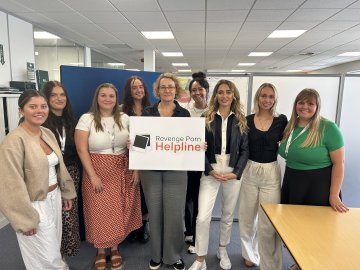Today (Thursday 7th July) the Law Commission has set out new recommendations to the Government to criminalise ‘downblousing’ and the sharing of pornographic deepfakes without consent as part of a new reform to protect victims of intimate image abuse. The Commission is also putting in place a ‘clearer legal framework’ to simplify and strengthen the law around intimate image abuse whilst stating that these new reforms will lead to easier and tougher prosecutions for those who commit offences.
These new recommendations have been put forward in response to a review by the Law Commission around the current laws around intimate image abuse. It was recognised that perpetrators were evading prosecution due to ‘gaps in law’ that were not taking into account the wider ranges of intimate image abuse and thus failing to protect all adults experiencing these behaviours.
This new legal framework is looking to govern behaviours around intimate image abuse by breaking down and defining where an offence has occurred. These are as follows.
- Base Offence: if someone intentionally takes or shares an intimate image without consent. This is regardless of motivation and not just related to causing humiliation or distress. This offence could lead to a maximum of 6 months in prison.
- Three additional offences: the taking or sharing of an intimate image without consent with the motivation to obtain sexual gratification, cause humiliation, alarm or distress. This also includes if the perpetrator has threatened to share an intimate image. Offenders could be sentenced to 2 or 3 years’ imprisonment.
- Installing equipment: installing equipment (e.g. hidden camera), in order to take an intimate image of a person without their consent would be considered an offence.
As part of this new reform, the Law Commission has also stated that all victims of intimate image abuse will receive ‘lifetime anonymity’ in an effort to empower adults experiencing intimate image abuse to report incidents and ‘support prosecutions’. This has come in response to only adults experiencing voyeurism or Upskirting being currently eligible for anonymity.
Sophie Mortimer (Revenge Porn Helpline Manager at SWGfL said):
“We welcome the publication of the Law Commission’s final report and recommendations on the taking, making and sharing of intimate images without consent. There is much included here that will, once in law, protect the people that come to the Revenge Porn Helpline for advice and support. Vitally important is the focus on the consent of those in intimate images; and the right to anonymity will give a crucial protection to those whose consent has been violated. These recommendations make it clear that this abuse is not acceptable and those who perpetrate it will face serious and appropriate consequences. We encourage government to ensure the swift and smooth enactment and enforcement of this legislation so that these additional protections are available to everyone as soon as possible.”
Commenting on the reforms for Government, Professor Penney Lewis, the Law Commissioner for Criminal Law, said:
“Sharing intimate images of a person without their consent can be incredibly distressing and harmful for victims, with the experience often scarring them for life.
“Current laws on taking or sharing sexual or nude images of someone without their consent are inconsistent, based on a narrow set of motivations and do not go far enough to cover disturbing and abusive new behaviours born in the smartphone era.
“Our new reforms for Government will broaden the scope of the criminal law to ensure that no perpetrators of these deeply damaging acts can evade prosecution, and that victims are given effective protection.”






